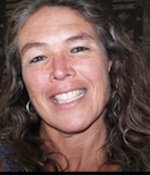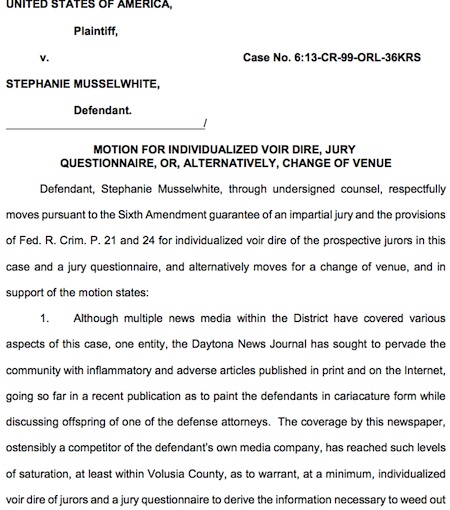
News-Journal has not reported on defense motion against it 4 days ago & has ignored internet newspaper's inquiries as to merit of accusation

 Headline Surfer® inset photo /
Headline Surfer® inset photo / DAYTONA BEACH -- One of the remaining defendants about to go to trial in the alleged Volusia mortgage fraud case has asked a federal judge to consider polling jurors individually or even consideration for a change of venue a because of incessant coverage in the Daytona Beach News-Journal that her attorney asserts has crossed the line with "inflammatory and adverse articles published in print and on the Internet."
"Although multiple news media within the District have covered various aspects of this case, one entity, the Daytona News Journal has sought to pervade the community" with what is perceived as distorted coverage, insisted the attorney for defendant Stephanie Musselwhite,"going so far in a recent publication as to paint the defendants in caricature form while discussing offspring of one of the defense attorneys."
Miami-based attorney Richard Klugh filed his motion on behalf of his client, Stephanie Musselwhite, shown at far left.
"Although multiple news media within the District have covered various aspects of this case, one entity, the Daytona News Journal has sought to pervade the community" with what is perceived as distorted coverage, insisted Richard Klugh, the attorney for defendant Stephanie Musselwhite,"going so far in a recent publication as to paint the defendants in caricature form while discussing offspring of one of the defense attorneys."
"The coverage by this newspaper, ostensibly a competitor of the defendant’s own media company, has reached such levels of saturation, at least within Volusia County, as to warrant, at a minimum, individualized voir dire of jurors and a jury questionnaire to derive the information necessary to weed out the inflammatory and pervasive coverage," wrote Musselwhite's Miami-based counsel, Richard C. Klugh, in a motion filed with the clerk of the court in the federal courthouse in Orlando on Thursday.

Klugh has asked in the three-page motion for "individualized voir dire, jury questionnaire or alternatively, change of venue."
Voir dire is French for "to speak the truth," a legal process in which groups of prospective jurors -- typically a dozen to several dozen -- are seated in a courtroom and asked questions as to whether they know anything about the circumstances of a case to determine whether individuals in the group could be impartial in hearing evidence at trial and be counted on to reach an impartial verdict of guilty or not guilty without pre-conceived influences.
In this case, Klugh is asserting to the Orlando division of the U.S. District Court for the Middle District of Florida, that in order to give his client a fair and impartial trial because of what he has described as inflammatory coverage in the Daytona Beach News-Journal, it might be necessary to carry out void dire individually with one prospective juror at a time.
The intent is to conduct questioning of an individual juror candidate out of the earshot of others with the potential the jury pool could become tainted by one of them discussing what they've read in the newspaper that goes beyond the normal scope of coverage with inflammatory reporting and misleading information that could negatively influence other jurors in the same courtroom.
Individual voir dire is far more time consuming for obvious reasons. In the alternative, Klugh suggested written questionnaire, and if necessary a change of venue, altogether far more expensive because a trial would have to be held in another part of the state, which could become a logistical nightmare and a hardship in terms of travel and overnight accommodations for witnesses and court personnel.
The stakes are high at this point for Klugh's client, Musselwhite, accused in a 14-count indictment handed up by a grand jury of engaging in an organized scheme to defraud several lending institutions.
Musselwhite pleaded not guilty at her arraignment and the presumption of innocence remains with her unless or until the government can demonstrate beyond a reasonable doubt to a jury at trial that she is guilty of one or more of the 14 counts alleged in the grand jury.

